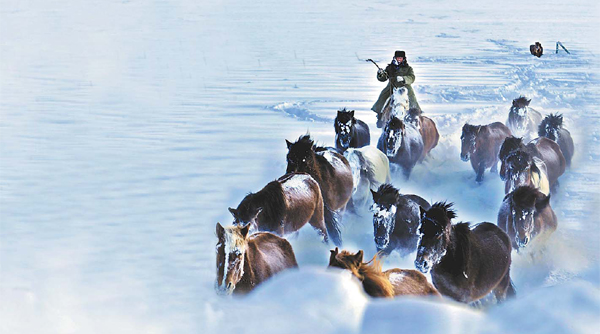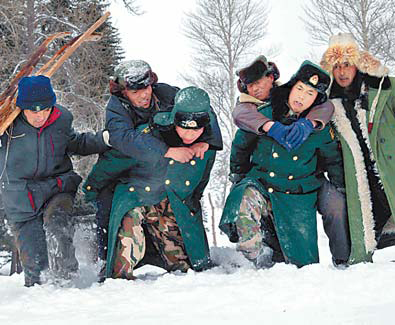Society
Earth suspected in 'mini ice age'
By Li Jing (China Daily)
Updated: 2010-02-03 06:35
 |
Large Medium Small |
Chinese scientists say severe weather conditions and the scandal surrounding a famed study has opened the debate on alternative causes of climate change. Li Jing reports
|
 |
|
Herdsmen in the grasslands of Altay, Xinjiang Uygur autonomous region, drive horses through heavy snow last month. The region has experienced its worst snowstorm for six decades. Scientists have speculated that the Earth could be entering a ‘mini ice age.’ [Photo/Zhu Yiming] |
As world leaders descended on Copenhagen to engage in fierce debate over how to combat global warming last December, few would have predicted the planet was about to experience its harshest winter for decades.
Temperatures plummeted across the Northern Hemisphere and blizzards battered cities across China, Europe and North America, bringing planes, trains and automobiles to a crippling standstill. On Jan 3, Beijing was blanketed by the heaviest snowfall in 60 years, while three days later Hamburg in Germany registered its coldest day since 1963.
The extreme weather conditions have prompted many climate -change skeptics to speak out about the "much politicized" theories over global warming, with some scientists even speculating that the Earth could be on the cusp of a "mini ice age".
The Intergovernmental Panel on Climate Change (IPCC) has been forced to apologize for mistakes made in a 2007 report that stated the Himalayan glaciers would likely melt by 2035. Media reports showed the prediction was copied from a 2005 document entitled Overview of Glaciers, Glacier Retreat, and Subsequent Impacts in Nepal, India and China published by WWF, the international action group, which in turn lifted the information from an article in the New Scientist magazine.
The IPCC later admitted the information was not peer reviewed, which basically means verified by other scientists.
The scandal followed quickly on the heels of "climategate" in December, when several leading British scientists were exposed for publishing only data that supported the widely propagated theory that the planet is experiencing global warming due to man-made carbon emissions. E-mails leaked to the press showed the scientists were covering up problems in key temperature studies on which their work was based.
Calls for an honest, transparent and international debate on the climate is growing stronger.
Despite the IPCC's controversial fourth assessment report concluding that warming of the climate system is "unequivocal", Xie Zhenhua, China's top climate change negotiator, said the country is keeping an "open attitude" about global warming when he addressed a Jan 24 forum for BASIC countries - Brazil, South Africa, India and China.
|
 |
|
Soldiers help rescue residents of a village in Altay that was cut off by fi erce snowstorms. [Photo/Ding Ning] |
Statistics cited in the IPCC report showed the global average temperature has risen about 0.8 C since 1850, when nations began burning coal to power industrialization. More than 50 percent of this increase is "very likely" - more than a 90-percent possibility - the result of man-made "greenhouse gas emissions", the report said.














